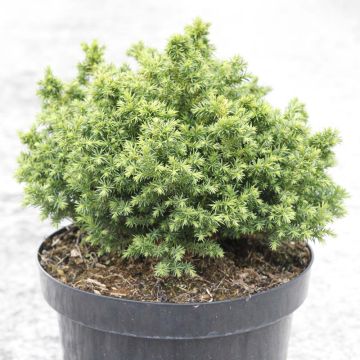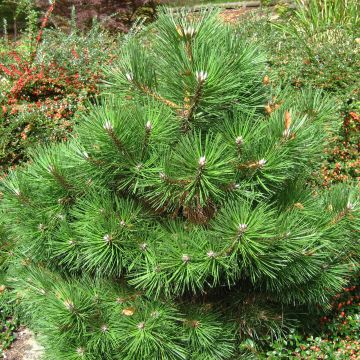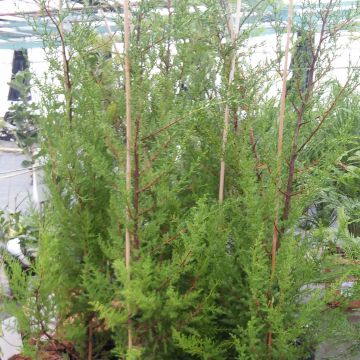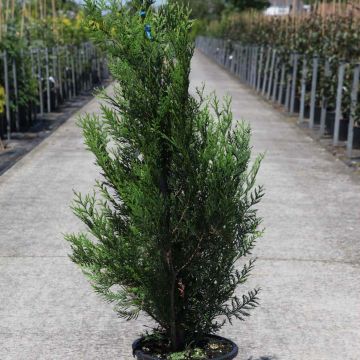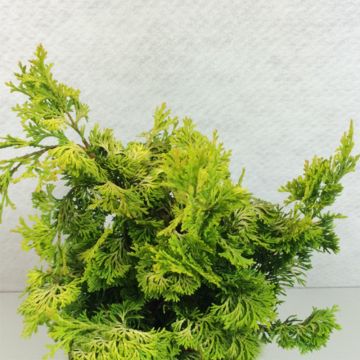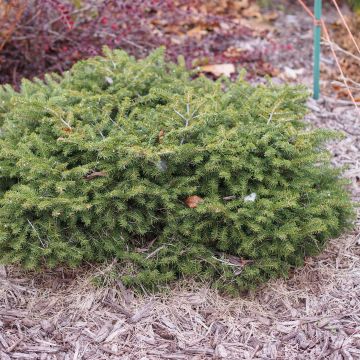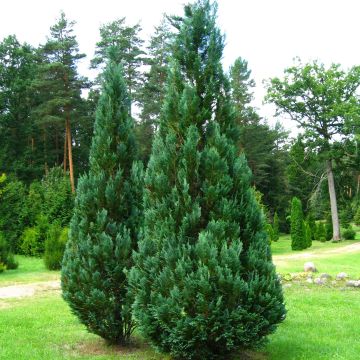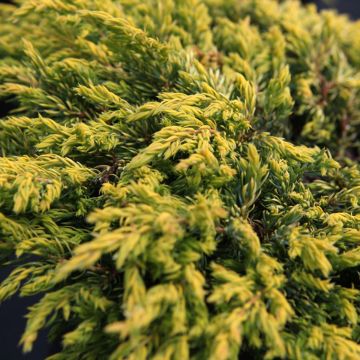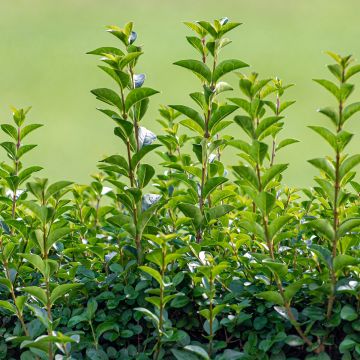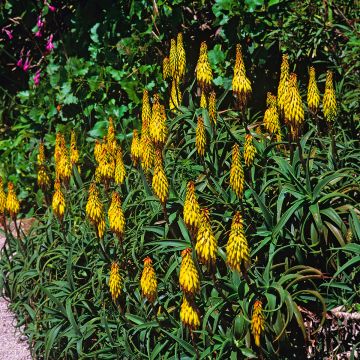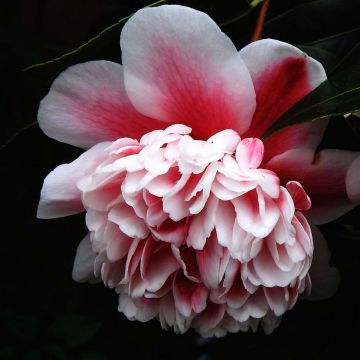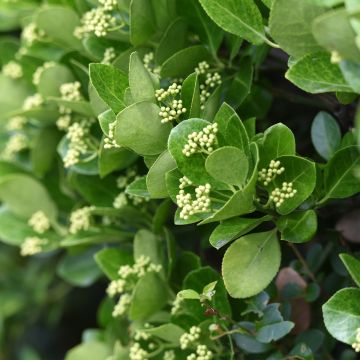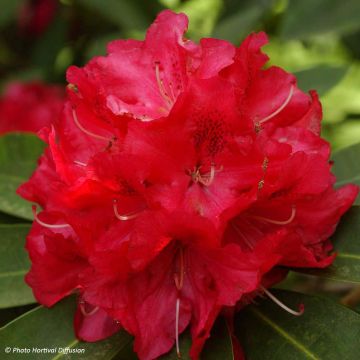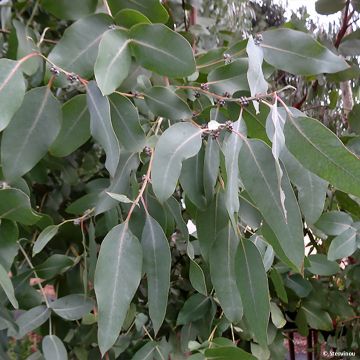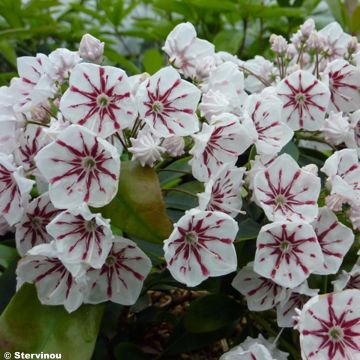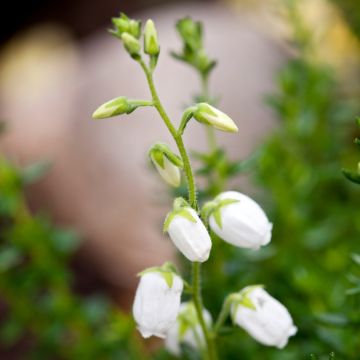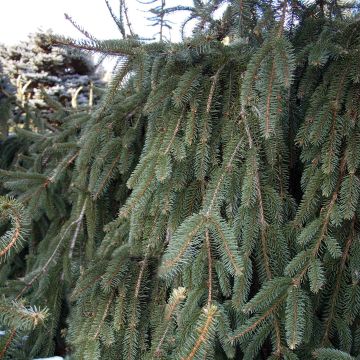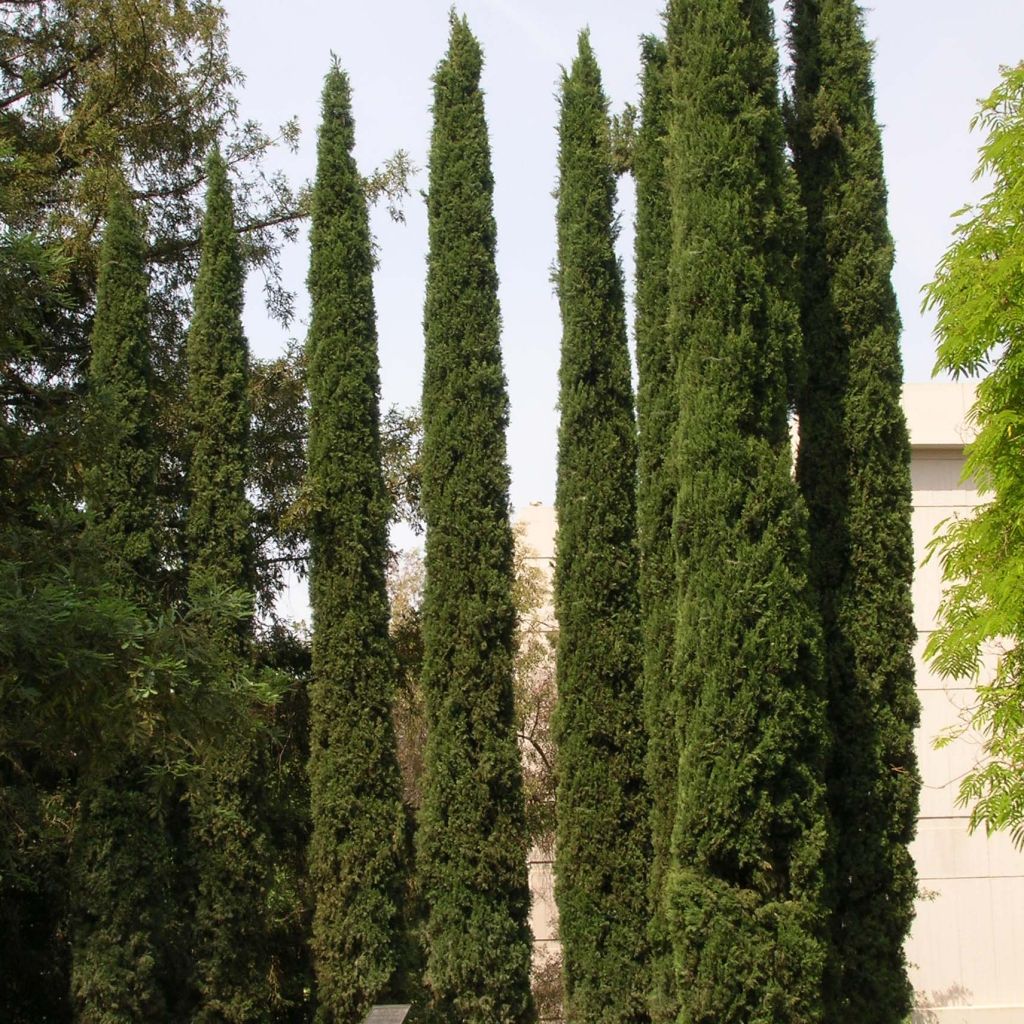

Cupressus sempervirens var. stricta
Cupressus sempervirens var. stricta
Cupressus sempervirens var. stricta
Italian Cypress, Mediterranean Cypress, Pencil Pine
This item cannot be shipped to the selected country
Oversize package delivery charge from €6.90
More information
Schedule delivery date,
and select date in basket
This plant carries a 24 months recovery warranty
More information
We guarantee the quality of our plants for a full growing cycle, and will replace at our expense any plant that fails to recover under normal climatic and planting conditions.
Oversize package: home delivery by special carrier from €6.90 per order..
Express home delivery from €8.90.

Does this plant fit my garden?
Set up your Plantfit profile →
Description
Cupressus sempervirens 'Stricta', commonly known as the Italian Cypress, is a spontaneous form of common Cypress, selected and propagated for its narrow and tall, remarkably architectural habit. This large evergreen conifer with dark green foliage grows quickly in its youth and can live for 500 years, eventually developing its characteristic silhouette. Like an ancient column, this Cypress is perfect for framing an entrance, bordering a long avenue, or structuring a large space. It tolerates rocky and poor soils, drought, and strong winds.
Cupressus sempervirens is a species in the Cupressaceae family, which is believed to be native to Asia. In nature, it is found in dry and open forests, often on limestone soil. Similar to Chamaecyparis, it differs in its rounded branchlets, arranged in fascicles around the main axis, and its larger cones with woody scales.
The 'Stricta' form, which can be found in the wild among populations of cypresses with a wider habit, is a natural mutation that has upright branches and produces fruits. Curiously, some of its offspring have a horizontal habit, which is why they are called Cupressus sempervirens var. horizontalis.
'Stricta' is a tall and narrow form, reaching a height of 10 to 14m (33 to 46ft) or even more, with a spread of 2m (7ft). By the age of 6, under good conditions, it will already have reached a height of 6m (20ft). This variety produces fruits, which can weigh down and widen the branches, resulting in a sometimes slightly dishevelled silhouette. Growing rapidly in its youth, it is adorned with aromatic, dark foliage made up of small, blunt-tipped leaves with resinous glands, arranged in imbricate clusters on short branchlets that themselves grow on upright branches. Like all common cypresses, its wood is highly fragrant and exudes resin under a relatively thin, grey-brown bark with fissures. Its root system is taprooted, allowing it to anchor deeply in the soil to draw water and nutrients and withstand even strong winds. It is hardy in well-drained soil, down to approximately -15°C (5°F). However, its tall habit does not appreciate the weight of snow, which can permanently deform it!
'Stricta' is perfect for framing an entrance, planted in groups of three, as was the custom in Provence, both as a signal to welcome visitors and as a beacon for lost travellers, indicating a welcoming human presence, fresh water, or a warm fire in the hearth. A boon for gardens in rocky areas with poor soil, where few trees thrive, its majestic habit uniquely structures a garden, whether it be contemporary, Italian, or Mediterranean in style. It can also be used as a standalone specimen, surrounded by grey-foliaged plants (such as Artemisia, lavender, Melianthus major, Perovskia atriplicifolia 'Blue Spire') or in an evergreen hedge, alongside Arbutus unedo, Holm oak, common juniper and its varieties, Ceanothus arboreus 'Skylark', or Eleagnus ebbingei, for example.
The Italian cypress symbolises immortality. Its fragrant wood, which was once used in all funeral rites, was also burned as incense.
Report an error about the product description
Cupressus sempervirens var. stricta in pictures
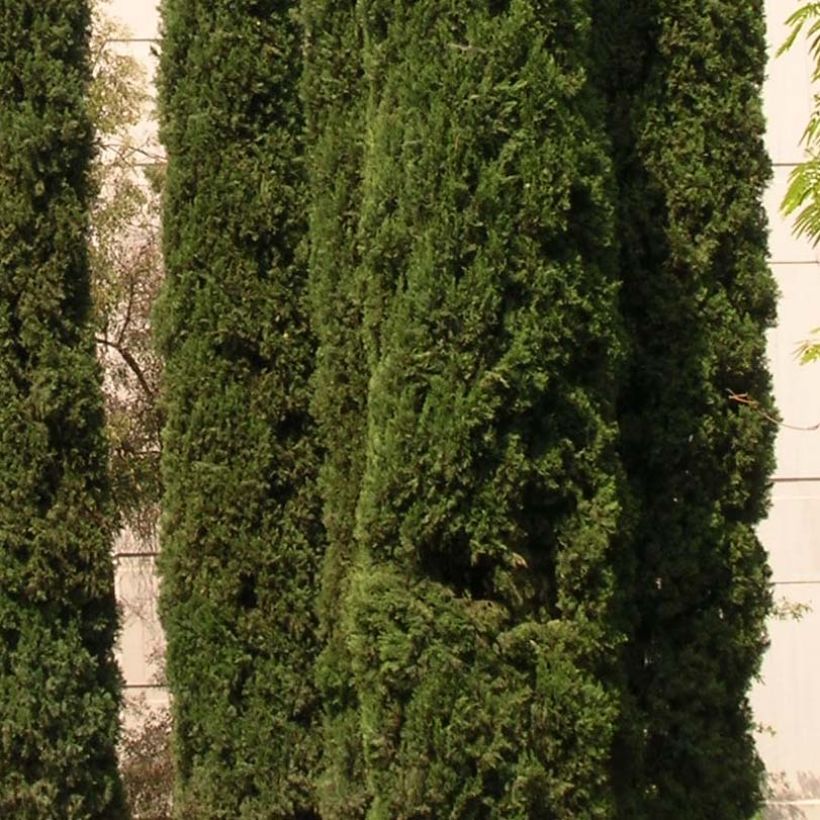

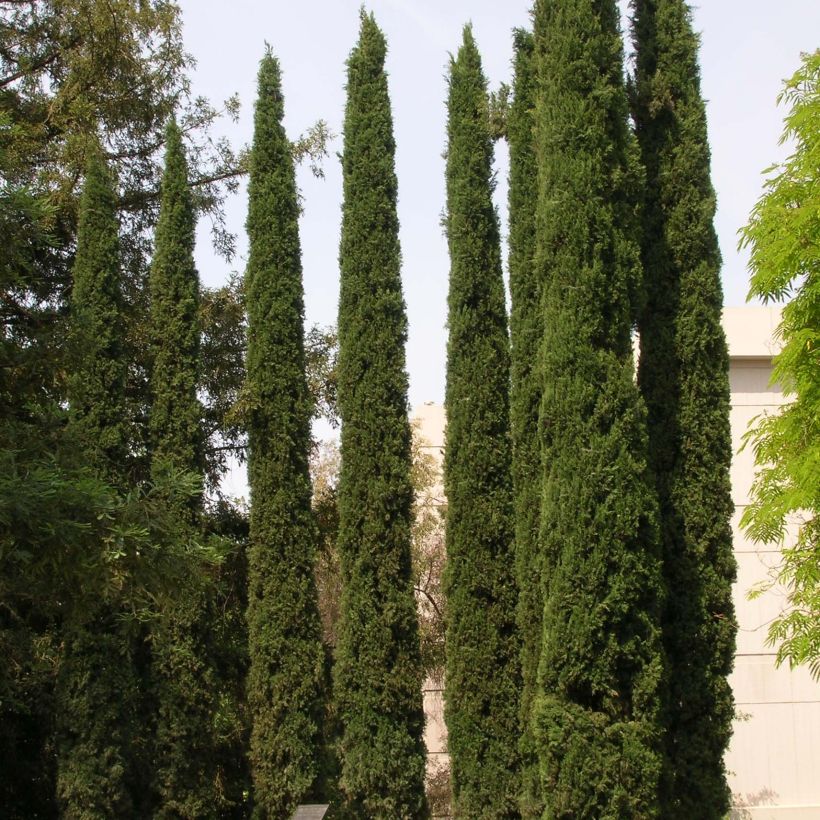

Plant habit
Flowering
Foliage
Safety measures
Botanical data
Cupressus
sempervirens var. stricta
Cupressaceae
Italian Cypress, Mediterranean Cypress, Pencil Pine
Mediterranean
atteinterespiratoire
Cette plante peut entraîner des symptômes allergiques.
Evitez de la planter si vous ou vos proches souffrez de rhinite saisonnière ("rhume des foins").
Davantage d'informations sur https://plantes-risque.info
Other Conifers A to Z
Planting and care
Plant in a sunny location in well-drained soil. It will tolerate rocky and poor soil, as its taproot will find a crack and widen it to go down and find water, often present in the subsoil of limestone formations. Plant in regions with mild winters. This plant theoretically withstands temperatures as low as -15°C (5°F) without any problems, but things get complicated in compact, clayey soil that is waterlogged in winter. Do not plant hedges too closely together to ensure good ventilation. This conifer can be susceptible to canker (a pathogenic fungus), especially if it undergoes repeated pruning or injuries. Its most common parasites are red spider mites, aphids, scale insects, and jewel beetles, which are virulent in hot and dry weather; it is advisable to spray the foliage with water in hot and dry weather to prevent mite proliferation.
Planting period
Intended location
Care
-
, onOrder confirmed
Reply from on Promesse de fleurs
Evergreen shrubs
Haven't found what you were looking for?
Hardiness is the lowest winter temperature a plant can endure without suffering serious damage or even dying. However, hardiness is affected by location (a sheltered area, such as a patio), protection (winter cover) and soil type (hardiness is improved by well-drained soil).

Photo Sharing Terms & Conditions
In order to encourage gardeners to interact and share their experiences, Promesse de fleurs offers various media enabling content to be uploaded onto its Site - in particular via the ‘Photo sharing’ module.
The User agrees to refrain from:
- Posting any content that is illegal, prejudicial, insulting, racist, inciteful to hatred, revisionist, contrary to public decency, that infringes on privacy or on the privacy rights of third parties, in particular the publicity rights of persons and goods, intellectual property rights, or the right to privacy.
- Submitting content on behalf of a third party;
- Impersonate the identity of a third party and/or publish any personal information about a third party;
In general, the User undertakes to refrain from any unethical behaviour.
All Content (in particular text, comments, files, images, photos, videos, creative works, etc.), which may be subject to property or intellectual property rights, image or other private rights, shall remain the property of the User, subject to the limited rights granted by the terms of the licence granted by Promesse de fleurs as stated below. Users are at liberty to publish or not to publish such Content on the Site, notably via the ‘Photo Sharing’ facility, and accept that this Content shall be made public and freely accessible, notably on the Internet.
Users further acknowledge, undertake to have ,and guarantee that they hold all necessary rights and permissions to publish such material on the Site, in particular with regard to the legislation in force pertaining to any privacy, property, intellectual property, image, or contractual rights, or rights of any other nature. By publishing such Content on the Site, Users acknowledge accepting full liability as publishers of the Content within the meaning of the law, and grant Promesse de fleurs, free of charge, an inclusive, worldwide licence for the said Content for the entire duration of its publication, including all reproduction, representation, up/downloading, displaying, performing, transmission, and storage rights.
Users also grant permission for their name to be linked to the Content and accept that this link may not always be made available.
By engaging in posting material, Users consent to their Content becoming automatically accessible on the Internet, in particular on other sites and/or blogs and/or web pages of the Promesse de fleurs site, including in particular social pages and the Promesse de fleurs catalogue.
Users may secure the removal of entrusted content free of charge by issuing a simple request via our contact form.
The flowering period indicated on our website applies to countries and regions located in USDA zone 8 (France, the United Kingdom, Ireland, the Netherlands, etc.)
It will vary according to where you live:
- In zones 9 to 10 (Italy, Spain, Greece, etc.), flowering will occur about 2 to 4 weeks earlier.
- In zones 6 to 7 (Germany, Poland, Slovenia, and lower mountainous regions), flowering will be delayed by 2 to 3 weeks.
- In zone 5 (Central Europe, Scandinavia), blooming will be delayed by 3 to 5 weeks.
In temperate climates, pruning of spring-flowering shrubs (forsythia, spireas, etc.) should be done just after flowering.
Pruning of summer-flowering shrubs (Indian Lilac, Perovskia, etc.) can be done in winter or spring.
In cold regions as well as with frost-sensitive plants, avoid pruning too early when severe frosts may still occur.
The planting period indicated on our website applies to countries and regions located in USDA zone 8 (France, United Kingdom, Ireland, Netherlands).
It will vary according to where you live:
- In Mediterranean zones (Marseille, Madrid, Milan, etc.), autumn and winter are the best planting periods.
- In continental zones (Strasbourg, Munich, Vienna, etc.), delay planting by 2 to 3 weeks in spring and bring it forward by 2 to 4 weeks in autumn.
- In mountainous regions (the Alps, Pyrenees, Carpathians, etc.), it is best to plant in late spring (May-June) or late summer (August-September).
The harvesting period indicated on our website applies to countries and regions in USDA zone 8 (France, England, Ireland, the Netherlands).
In colder areas (Scandinavia, Poland, Austria...) fruit and vegetable harvests are likely to be delayed by 3-4 weeks.
In warmer areas (Italy, Spain, Greece, etc.), harvesting will probably take place earlier, depending on weather conditions.
The sowing periods indicated on our website apply to countries and regions within USDA Zone 8 (France, UK, Ireland, Netherlands).
In colder areas (Scandinavia, Poland, Austria...), delay any outdoor sowing by 3-4 weeks, or sow under glass.
In warmer climes (Italy, Spain, Greece, etc.), bring outdoor sowing forward by a few weeks.

































